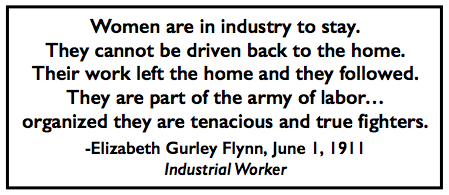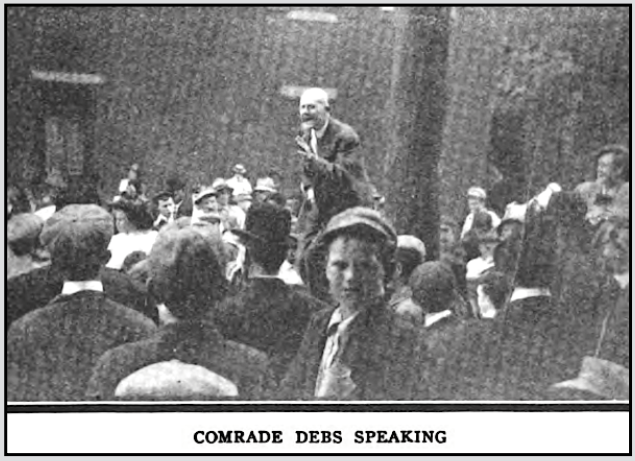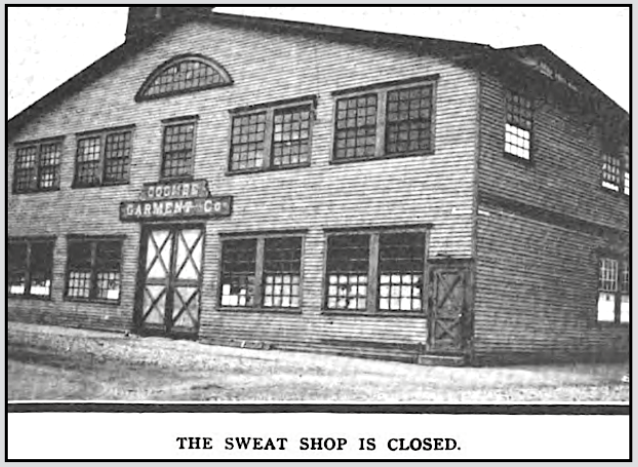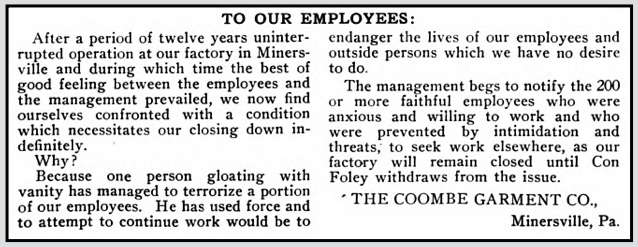 —————
—————
Hellraisers Journal – Sunday July 2, 1911
Elizabeth Gurley Flynn Describes Strike of Young Girls at Minersville
From the International Socialist Review of July 1911:
—–
Coombs became desperate. He threatened to move his factory to Brooklyn, where he claims a site has already been purchased, but the girls realize that he is bound to this region by economic ties which cannot easily be severed. He rents houses and owns a splendid residence in Minersville, and controls factories for Phillips in Tremont, Valley View, Mahoney City, Trackville and other places. Here he is a pillar of society, hobnobs with judges, and has his own automobile. Whereas, his importance would sink into insignificance in a great industrial center.
We are making efforts not only to tie up all of his other plants, but every factory and mill in this region, where wages are inadequate and women are shamelessly exploited. Our attempts in Tremont illustrate our difficulties and Mr. Coombs’ methods. While we were addressing the girls from one factory Mr. Coombs rushed past in his machine and into his factory, where he detained the girls for about five minutes. His intimation that if they listened to the agitators they need not report for work further had effect, for when he dismissed them, they marched convict-like, arm in arm, past the meeting, and could not be induced to listen.
These girls had their wages raised to nine cents to head off a strike. Thus, they are profiting by the struggle of the girls in Minersville, while virtually scabbing on them. Far from being discouraged, however, we feel that Coombs has shown his fear, and we intend to arouse these girls to a realization of the situation.
This strike, the first of its kind in the anthracite region, has been invaluable, as it has served to set ablaze the smouldering rebellion of other women workers. It was followed by a strike in the silk mill of Shamokin, and a partial strike in the silk mill of Pottsville.
We are hopeful that it is the beginning of a real union movement among the women. Craft unionism has ignorantly segregated the workers until the women, neglected and unorganized, were left to the mercy of the capitalist wolves. Miners worry only for miners, brewery workers for themselves, and so on through the list. But the employers are alert and class conscious. The boss of the Fox factory in Tremont told the girls if they attempted to influence the Coombs girls, they would be discharged.
Committees of business men played their usual role of urging the girls to compromise for nine cents, but the girls, on the advice of the local comrades, refused the offer. As for the craft unionists, the girls could have been sold out and defeated, and no aid or advice extended to them, had not the Socialists taken up their cause. Coombs approached Foley “to fix up things,” but was confronted by a committee of his own girls, with whom he refused to deal.
But the girls have not missed the “labor leaders,” for they have been visited by both Big Bill Haywood and Eugene V. Debs. Debs stopped on his way through to Shamokin, sacrificing his personal comfort and rest between dates. He spoke on the street corner, from an old wagon, surrounded by dust-begrimed miners, striking girls and little children, and his ringing voice speaking words of cheer and revolutionary spirit, sounded throughout the little town. Two cossacks paced back and forth; they were called in to drive the girls from the picket line, and arrogantly sought trouble at the meeting.
Comrade Debs, like a gallant old war horse, entered the fray and poured forth his denunciation of Coombs and his kind in words of burning fire. Everybody heard his message of industrial unionism to the toilers.
We have talked industrial unionism to the girls throughout the progress of the strike, and have advanced the I. W. W. as the union in which they belong. The girls are embracing the ideas of Socialism, and the strike cannot be a failure. Successful, they will organize for better things. Defeated, the spirit that can never die will have been infused into their beings.
As did Debs and the other comrades before leaving, we must give three cheers for the striking girls of Minersville.
—————
[Emphasis added.]
~~~~~~~~~~~~~~~~~~~~
SOURCES & IMAGES
Quote EGF Organize Women, IW p4, June 1, 1911
https://www.marxists.org/history/usa/pubs/industrialworker/iw/v3n10-w114-jun-01-1911-IW.pdf
International Socialist Review
(Chicago, Illinois)
-July 1911, page 9
https://www.marxists.org/history/usa/pubs/isr/v12n01-jul-1911-ISR-H-GR-ocr.pdf
See also:
Hellraisers Journal: International Socialist Review: “One Boss Less, The Minersville Strike”
by Elizabeth Gurley Flynn Part I
May 18, 1911, Harrisburg Daily Independent-General Strike Called at Minersville after Debs Visit
https://www.newspapers.com/clip/80610364/may-18-1911-harrisburg-daily/
Appeal to Reason of June 3, 1911, page 3
“Debs in Pennsylvania” by George D Brewer
-by telegraph to AtR from Pittsburg PA, May 26
https://www.newspapers.com/clip/80611844/june-3-1911-appeal-to-reason-re-may/
~~~~~~~~~~~~~~~~~~~~~~~~~~~~~~~~~~~~~~~~
Rebel Girl – Alyeah Hansen
Lyrics by Joe Hill



